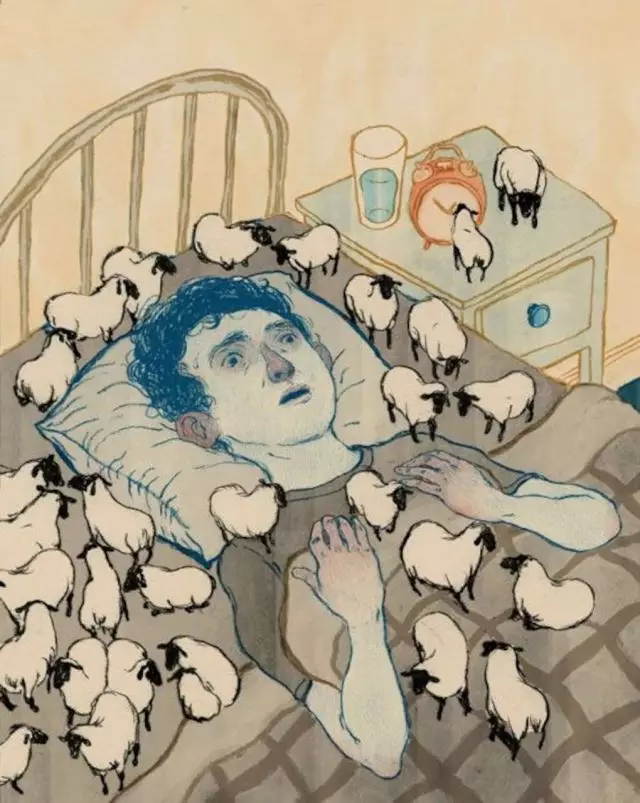We're only beginning to understand why we sleep to begin with, but we do know it's essential. Adults need 7 to 8 hours sleep at night, and adolescents need about 10. We grow sleepy due the signals from our body telling our brain we are tired, and signals from the environment telling us it's dark outside. The rise in sleep inducing chemicals, like adenosine and melatonin, send us into a light dose that grows deeper, making our breathing and heart rate slow down and our muscles relax. This non REM sleep is when DNA is repaired and our bodies replenish themselves for the day ahead.
我們也只剛剛才開始了解人類需要睡眠來開始美好的一天,但我們確實知其重要性。成年人每晚需要7至8小時的睡眠,青少年則需要10小時。我們覺得困倦是因為身體向大腦發(fā)出了疲倦的信號,也因為外界環(huán)境給予了我們天黑的信號。人體則加量分泌能增進睡意的化學物質,如腺苷和褪黑激素,讓我們呼吸和心跳頻率降低,并使肌肉放松。這種非快速眼動睡眠發(fā)生在DNA修復以及身體自我補給時。
In the United States, it's estimated that 30% of adults and 66% of adolescents are regularly sleep-deprived. This isn't just a minor inconvenience. Staying awake can cause serious bodily harm. When we lose sleep, learning, memory, mood, and reaction time are affected. Sleeplessness may also cause inflammation, hallucinations, high blood pressure, and it's even been linked to diabetes and obesity.
調查發(fā)現(xiàn),美國30%的成年人與66%的青少年睡眠不足。可別小看了睡眠不足的后果。一直不睡覺會嚴重損害身體健康。當我們長時間不睡覺時,學習能力,記憶力,情緒以及反應能力將受到影響。缺乏睡眠也可能導致炎癥,幻覺,高血壓,甚至糖尿病和肥胖都與睡眠不足有關。

In 2014, a devoted soccer fan died after staying awake for 48hrs to watch the world cup. While his untimely death was due to a stroke, studies show that chronically sleeping fewer than 6 hours a night increasing stroke risk by 4.5 times, compared to those getting consistent 7 to 8 hours of shut-eye.
2014年就有一位足球死忠粉在持續(xù)48小時觀看世界杯后死亡。雖說他的早逝歸根結底是因為中風,但研究表明,夜間睡眠少期少于6小時的人同長期保持7-8小時睡眠的人相比中風的風險會增加4.5倍。
How can sleep deprivation cause such immense suffering? Scientists think the answer lies with the accumulation of waste products in the brain. During our waking hours, our cells are busy using up our day's energy sources, which get broken down into various by-products, including adenosine. As adenosine builds up, it increases the urge to sleep, also known as sleep pressure. In fact, caffeine works by blocking adenosine receptor pathways. Other waste products also build up in the brain, and if they're not cleared away, they collectively overload the brain and our thought to lead to the many negative symptoms of sleep deprivation.
睡眠不足為何如此痛苦呢?科學家們認為其原由為大腦中廢物的累積。當我們清醒時,細胞正忙于消耗我們一天中產(chǎn)生的能量,而這些能量的產(chǎn)生會分解出各種副產(chǎn)品,例如腺苷,腺苷的不斷產(chǎn)生會使睡眠欲望增加,這樣的欲望而被稱作睡眠壓力。事實上,咖啡因就是通過阻礙腺苷的接收途徑來發(fā)揮作用的。其他的垃圾產(chǎn)物也會在大腦中堆積,如果他們不被清理掉,大腦將超負荷運轉,同時可能會引起許多睡眠不足的不良癥狀。
So what's happening in our brain when we sleep, to prevent this? Scientists found something called the Glymphatic System, a clean-up mechanism that removes this build up and is much more active when we're asleep. It works by using cerebrospinal fluid to flush away toxic by-products that accumulate between cells. Lymphatic vessels, with serve as pathways for immune cells have recently been discovered in the brain, and they may also play a role in clearing out the brain's daily waste products.
所以當我們睡著時,大腦是如何防止這種情況發(fā)生的呢?科學家們發(fā)現(xiàn)了腦部的類淋巴系統(tǒng),它是一種可以清除這些垃圾產(chǎn)物的清潔機制,并且在我們睡眠時比較活躍。這種機制利用腦脊髓液將細胞間積累的有毒副產(chǎn)品沖刷掉。最近,研究員發(fā)現(xiàn),在大腦中作為免疫細胞通道的淋巴血管,這些血管可能也起到了清理大腦日常垃圾的作用。
While scientists continue exploring the restorative mechanisms behind sleep, we can be sure that sleeping into slumber is a necessity, if we wanna maintain our health and our sanity.
盡管科學家們還在繼續(xù)探索人睡著后的修復機制,我們可以肯定的是,如果我們想保持健康的身心,良好的睡眠是非常必要的。











